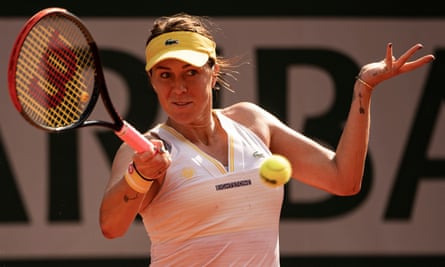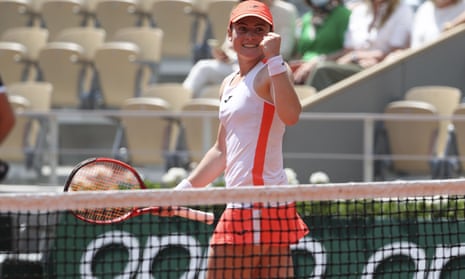Never before in the open era history of women’s tennis, an unpredictable sport even in regular times, had six of the final eight players at a major all been first-time quarter-finalists. Yet the pair of duels on Tuesday at the French Open between four players searching for their first semi-final was a comprehensive demonstration of its merits as all four fought tooth, nail and to the death, with Tamara Zidansek and Anastasia Pavlyuchenkova emerging in extra innings to play for a spot in the final.
Earlier in the day, Zidansek, the lowly world No 85 of Slovenia who had never passed the second round of a grand slam tournament, rose to the moment against the highly favoured 33rd seed, Paula Badosa of Spain, winning 7-5, 4-6, 8-6 in a desperately tense encounter. Pavlyuchenkova, seeded 31st, followed immediately and went even further as she defeated the 21st seed, Elena Rybakina, 6-7 (2), 6-2, 9-7.
For Zidansek, her continued success is a triumph in the face of one of the greatest challenges in tennis. So many players have secured big upsets over the top players at some point in their careers, but most return to the court shortly after and struggle to replicate their form under heightened expectations.
Nine days ago Zidansek upset Bianca Andreescu, the sixth seed, 6-7 (1), 7-6 (2), 9-7 in the first round of the tournament. Instead of fizzling out anonymously during the week, she has used it as a springboard to the tournament of her life.
On the court Zidansek, 23, is a petite, resourceful player who on the day-to-day grind of the tour is vulnerable to being overpowered by bigger hitters such as Badosa. But when she has the courage to lean into the court and go after her heavy, spin-laden forehand, she has shown that it can pierce many of the best defences.
In the biggest match of her career, that is precisely what she did. Zidansek rolled to a 7-5, 3-1 lead by hitting every forehand with purpose and as she determinedly controlled the baseline, it was the most destructive shot in the match. Her superior defence and resourcefulness further separated her from Badosa, a tall and powerful baseliner, but whose game is rigid and unathletic.

After nerves struck Zidansek and Badosa dragged her into the third set, the match culminated in a desperately tense game at 6-6 on Zidansek’s serve. Under a level of pressure she had never experienced in her life, she stood atop of the baseline, lasering forehand winners until the ball no longer came back and she had clinched the biggest win of her career. “At that point you just kind of fight for your life,” she said afterwards.
Pavlyuchenkova, 29, followed Zidansek on to the court with more experience than the rest of the quarter-finalists combined, but in her case that also meant she was potentially weighed down by the heaviest baggage. While the Russian is one of the two remaining players in the draw to have reached a major quarter-final before, these are not necessarily happy memories. She had lost all of her six previous quarter-finals and nor was she successful in her five doubles quarter-finals.
A decade ago in 2011, a 19-year-old Pavlyuchenkova was emerging on the tour after one of the most dominant junior careers in recent memory when she made her mark on Paris by breaking through to reach her first quarter-final there. Her ranking has since only peaked at 13th. At last, she has finally taken another step forward.
It took all of her willpower and concentration against Rybakina, 21, a destructive ball striker who defeated Serena Williams in the previous round and came out hitting freely. Pavlyuchenkova herself possesses some of the cleanest groundstrokes in the game but as in her previous three-set wins against Aryna Sabalenka, the third seed, and Victoria Azarenka, she drew on all of the experience garnered over those 10 years.
Each time Rybakina established a lead and seemed to be on the brink of breaking away, Pavlyuchenkova remained composed, minimised her errors and focused on exposing Rybakina’s movement. Each time, she pegged her back. In the final set, Pavlychenkova recovered from a break down at 2-3 and then refused to relinquish serve until Rybakina finally crumbled. Until it was finally safe to call herself a grand slam semi-finalist.

Comments (…)
Sign in or create your Guardian account to join the discussion